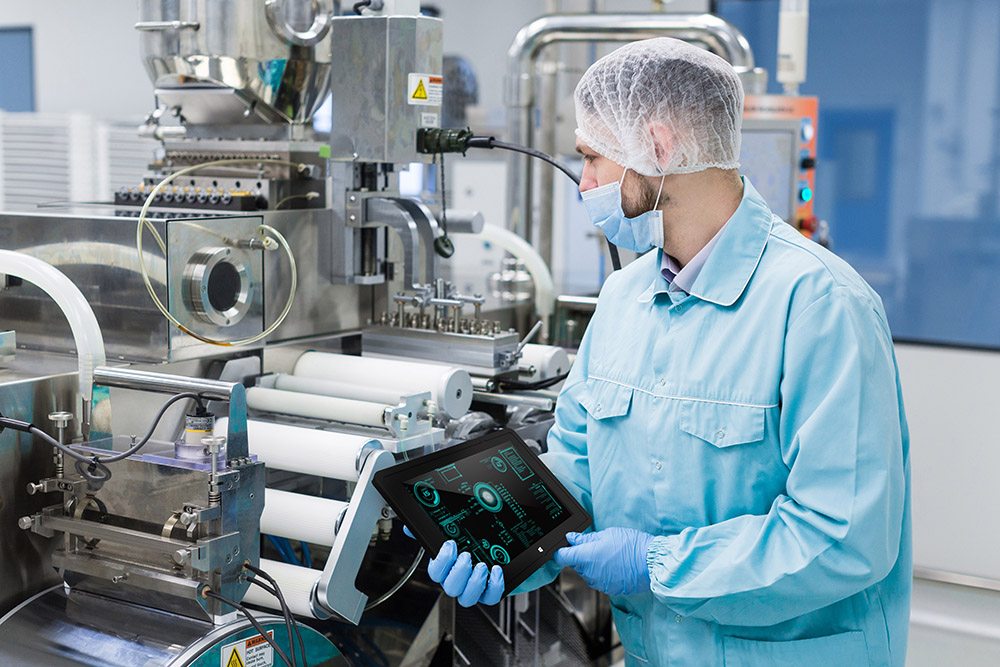
Utilizing Big Data for Big Gains in Pharmaceutical Manufacturing
Critical industries, including the pharmaceutical industry, are increasingly utilizing data to make better decisions about operations. Investments in big data in pharmaceuticals will account for more than $7 billion by the end of 2021. The term “big data” refers to the data itself, plus the supporting technologies that capture, store, manage and analyze it to solve complex problems. Strategies to utilize big data can potentially add $100 billion in value to the pharmaceutical industry by improving research and development, according to a 2013 McKinsey Global Institute report. The impact of artificial intelligence alone on pharmaceutical development is expected to grow to more than $5 billion in value by 2024, according to Big Data Analytics.
Digital technologies can assist in data collection and analysis. New devices that are purpose-built for hazardous environments, like pharmaceutical manufacturing facilities that contain potentially explosive materials, can distribute that information among teams. From the research and development stages through the manufacturing process and supply chain, new technologies can lower costs, speed up production and increase accuracy. In short, big data and intrinsically safe technologies that support its management can inform better decision-making that can help improve efficiency and safety in the pharmaceutical industry.
Monitoring pharma manufacturing
Pharma companies can continuously monitor manufacturing using process analytical technology (PAT) to understand how factors like temperature and humidity might influence drug production and product outcomes. With better data collection and the use of artificial intelligence and machine learning to generate feedback, pharma companies can reduce errors and increase yield.
Intrinsically safe IoT sensors that are specifically designed for combustible environments such as pharmaceutical manufacturing can collect environmental data about temperature, pressure, humidity and other conditions that could impact development. By monitoring this data, organizations can identify anomalies that may indicate potential problems and perform predictive maintenance or implement changes in operations to correct and/or improve processes and reduce operational downtime.
Interpreting and using data
Industry-specific applications can analyze manufacturing processes to inspire better decision-making in the pharmaceutical industry. Predictive data modeling and visualization decrease costs in drug discovery, as well as provide insight for tweaking production processes for better outcomes.
Instead of costly clinical trials, investment in AI, applications and computer learning can reduce the time involved in pharmaceutical development, and, consequently, reduce costs for pharmaceutical manufacturers. Pharma companies spend an average of $2.6 billion developing a single drug. In certain cases, process changes made after introducing data analytics have contributed to 50 percent increases in production yields, saving $5 million to $10 million per year on the production of just one substance.
Advanced data analysis can also help pharmaceutical manufacturers improve safety. Intrinsically safe sensors can collect data to be analyzed using Bayesian methods, which can identify anomalies that may highlight potential failures or safety concerns.
Sharing data
Pharmaceutical companies screen 5,000 to 10,000 chemical or biological compounds to find one that can potentially treat health conditions, according to the Association for Packaging and Processing Technologies (PMMI). Data analysis could theoretically improve this process if companies would share data about suitable inputs. However, such information is highly proprietary in the pharma industry, thus data is not necessarily shared among organizations, resulting in data silos, which may stifle best practices that could improve drug development.
Data silos also exist within an organization – different groups may be cut off from data due to regulations or because they don’t have certified devices on which to receive, access or send information. Integrating data from various systems involved in the industrial pharmaceutical industry can help prevent data silos, where groups do not share information and, thus, are not fully informed about the efficacy, efficiency and safety of processes.
Integrating data across groups requires not only collecting trustworthy data but also linking systems that manage data, quality, workflow and security associated with that data. When organizations adopt a data-centric view of data ownership, internal and external data may be shared and utilized to its fullest potential for improving processes, from R&D through delivery.
IoT can be implemented in pharmaceutical manufacturing to connect data-based decisions across organizations. Integrating safe, smart devices into the manufacturing process can enhance accuracy and data sharing.
Utilizing dashboards to visualize data on intrinsically safe tablets inside hazardous areas of pharmaceutical operations enables rapid, data-driven decision making. Data can also be shared via tablets in near real time, helping to make asset performance and management more transparent, plus facilitating process optimization.
Intrinsically safe tablets also enable frontline pharma personnel to record data directly in hazardous areas. In the United States, the Federal Drug Administration (FDA) requires barcodes on pharmaceuticals to ensure safety in creating compounds, as well as proper handling and distribution. Tablets that incorporate barcode scanning applications such as AegexScan can help facilitate safe and accurate pharmaceutical production for improved compliance.
Going forward
Pharmaceutical manufacturers can use big data to improve processes if they invest in tools for safe and secure data collection, analysis and sharing. From research and development to manufacturing to distribution, the pharmaceutical industry can benefit from collecting data via intrinsically safe IoT sensors, utilizing analytics, and sharing findings on intrinsically safe tablets to optimize processes and improve safety, productivity and reliability.
Contact Aegex Technologies to learn how our aegex10 Intrinsically Safe Tablet and NexVu IoT Sensor Solution can greatly enhance pharmaceutical manufacturing.
